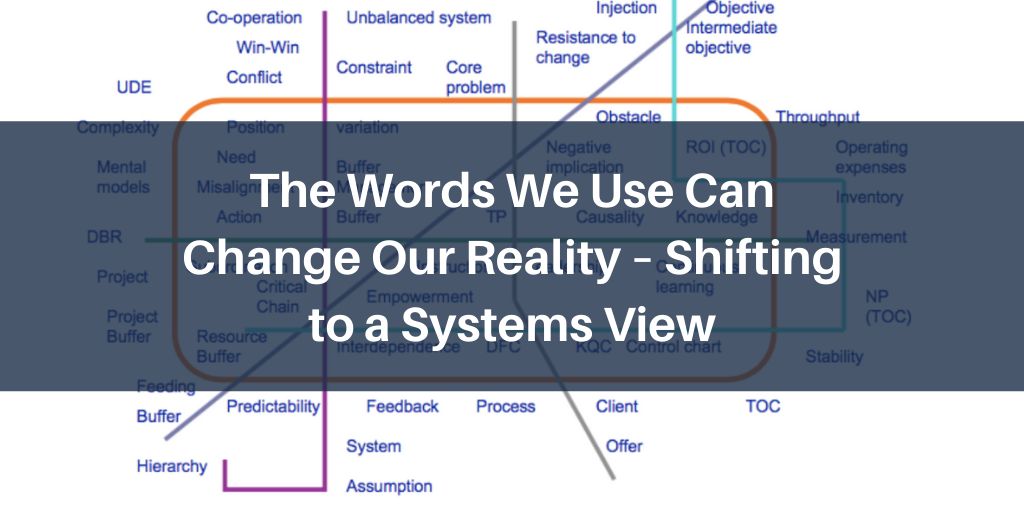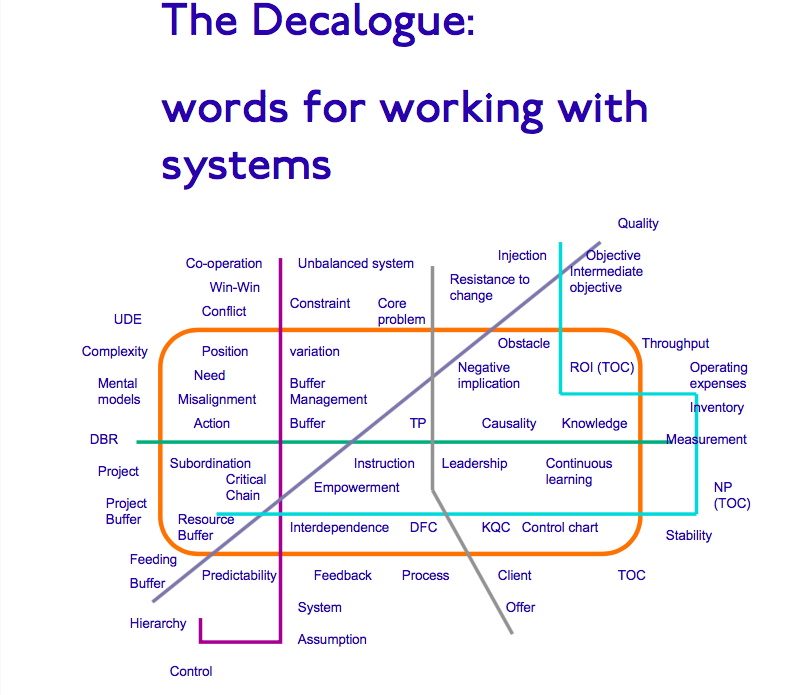
This morning I spoke to a highly accomplished, bi-lingual woman who works in software. We agreed that the words we use when we work can have an enormous impact. For example, in her environment, the word “project” has acquired a stigma because of the pain associated with it so now she talks about “initiatives”. This small changed has helped.
The fact is that we create our reality through language. The words we use express and reinforce our mental models. They reflect a culture and a worldview.
When we want to introduce change it’s important to support the effort with the words that will encourage new behaviours. At Intelligent Management we help organizations introduce and adopt a systems view so they can improve and accelerate all the flow, from the input of suppliers and the market all the way through to their products and services and the feedback they receive from customers for continuous improvement and innovation. Working with a systems view means having the words that help you to do that.
To sum up the key terms that indicate how we can work within and on systems and the field of knowledge required, we produced a word map to accompany our glossary for ‘The Decalogue’ methodology that encompasses the approaches of W. Edwards Deming and the Theory of Constraints. That was a few years ago. It’s time to add a new “line” to the map; since we produced it we have continued to evolve ‘The Decalogue’ and true to our scientific origins, we have looked to science for our basis. Here we look at some new terms to add to our word map.
Working with a systems view: Complexity, networks, emergence
Addressing complexity is probably one the greatest challenges of our times. The reason for the increasing importance of this issue is related to the exponential growth of interconnections and interdependencies that has arisen in contemporary society and organizations.
Science is unveiling the patterns of connections that exist at every level of our existence and technology provides us with unprecedented possibilities for integration and cooperation. However, the inherent non-linearity that governs the emergence of all the phenomena that we label as “complex” is still largely addressed with inadequate tools and methods.
Working with a systems view: Networks
Complexity, in the context of managing organizations, has two components that are strictly interconnected: the first is related to our increasing understanding of organizations as networks within networks; the more nodes and links there are in a network, the more complex it is. The second component concerns variation (the impossibility of repeating any process in exactly the same way). Variation is intrinsic to any human activity, and it strongly impacts the dynamic of the network, because the entropy of a closed system will always increase.
Working with systems view: Network of projects
Philosophically and scientifically, the Decalogue methodology attempts to shift management from a mechanistic, Newtonian worldview in which the results of the whole organization equal the sum of its individual, separate and hierarchical parts, towards a systemic and interdependent network. The shift is achieved by combining the Theory Of Constraints with a systemic view based on interdependencies and interactions. It does so in practical terms by:
1. building interdependent processes managed through the control of variation;
2. subordinating these interdependencies to a strategically chosen element of the system called constraint;
3. designing the organization as a network of interdependent projects with a goal.
The field of management is in continuous flux in its attempts to adapt to the new challenges of complexity. All the more reason to adopt a systemic approach that embraces continuous improvement and innovation as a basis for sustainability.
Contact: intelligentmanagement@sechel.ws
SCHEDULE AN INTRODUCTORY CALL WITH US








Leave a Reply